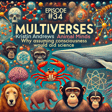
21| How and why do animals play? — Gordon Burghardt
Many animals play. But why?
Play has emerged in species as distinct as rats, turtles, and octopi although they are separated by hundreds of millions of years of evolution.
While some behaviors — hunting or mating for example — are straightforwardly adaptive, play is more subtle. So how does it help animals survive and procreate? Is it just fun? Or, as Huizinga put it, is it the primeval soil of culture?
Our guest this week is Gordon Burghardt, a professor at The University of Tennessee and the author of the seminal The Genesis of Animal Play: Testing the Limits where he introduced criteria for recognizing animal play.
Gordon has spent his career trying to understand the experience of animals. He advocates for frameworks such as critical anthropomorphism and the umwelt so we can judiciously adjust our perspectives. We can play at being other.
This week Multiverses is brought to you by ... the internet.
Links
Milestones
(00:00) Introduction
(2:20) Why study play?
(4:00) Criteria for play
(5:00) Fish don’t smile
(5:50) The five criteria: 1. incompletely functional
(7:40) 2. Fun (endogenous reward)
(8:20) 3. Incomplete
(9:45) 4. Repeated
(10:50) 5. Healthy, stress free
(13:30) Play as a way of dealing with stress (but not too much)
(16:40) Parental care creating a space for play
(17:45) Delayed vs immediate benefits
(20:45) Primary, secondary and tertiary play
(26:00) Role reversal, imitation, self-handicapping: imagining the world otherwise
(31:00) Secondary process: play as a way of maintaining systems
(33:37) Tertiary process: play as a way of going beyond
(34:45) Komodo dragons with buckets on their heads
(39:22) Critical anthropomorphism
(42:40) Umwelt — Jakob von Uexküll
(49:18) Anthropomorphism by omission
(53:00) Play evolved independently — it is not homologous
(53:45) Do aliens play?
(1:00:10) Play signals — how to play with dogs and bears
(1:04:00) Inter species play
(1:09:00) Final thoughts



















